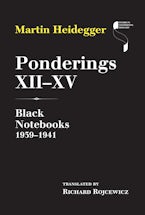- Home
- Studies in Continental Thought
- Basic Concepts of Aristotelian Philosophy
Preparing your PDF for download...
There was a problem with your download, please contact the server administrator.
Basic Concepts of Aristotelian Philosophy
Translated by Robert D. Metcalf and Mark B. Tanzer
Published by: Indiana University Press
296 Pages
- eBook
- 9780253004376
- Published: July 2009
$9.99
Other Retailers:
Volume 18 of Martin Heidegger's collected works presents his important 1924 Marburg lectures which anticipate much of the revolutionary thinking that he subsequently articulated in Being and Time. Here are the seeds of the ideas that would become Heidegger's unique phenomenology. Heidegger interprets Aristotle's Rhetoric and looks closely at the Greek notion of pathos. These lectures offer special insight into the development of his concepts of care and concern, being-at-hand, being-in-the-world, and attunement, which were later elaborated in Being and Time. Available in English for the first time, they make a significant contribution to ancient philosophy, Aristotle studies, Continental philosophy, and phenomenology.
Translator's Foreword
PRELIMINARY REMARKS
PART ONE
GENERAL INTRODUCTION TO
ANCIENT PHILOSOPHY
PART TWO
THE MOST IMPORTANT GREEK THINKERS:
THEIR QUESTIONS AND ANSWERS
SECTION ONE
Philosophy up to Plato
SECTION TWO
Plato's philosophy
SECTION THREE
Aristotle's philosophy
APPENDICES
Supplementary Texts
Excerpts from the Mörchen Transcription
Bröcker Transcription
Editor's Afterword
Greek-English Glossary
Robert D. Metcalf is Assistant Professor of Philosophy at the University of Colorado at Denver.
Mark B. Tanzer is Associate Professor of Philosophy and Chair of the Philosophy Department at the University of Colorado at Denver. He is author of Heidegger, Decisionism, and Quietism.
"We . . . have every reason to thank the translators for undertaking one of the most major Heidegger works to be published in recent years."
~Bryn Mawr Classical Review
"This text will be of vital interest to scholars interested in the genesis of Being and Time and Heidegger's early formulations of its central arguments in the 1920s. . . . [A]n important addition to Heidegger's works on Aristotle available in English.Vol. 48, No. 3, July 2010"
~Journal of the History of Philosophy
"This set of lectures from 1924 offers a refreshing and productive picture of Aristotle. . . . Heidegger opens up possibilities in these lectures for reading philosophy and for putting our thought in touch with the concrete."
~Philosophy in Review
"With a deep sensitivity to the nuances of Heidegger's German, this translation retains a liveliness and readability that captures something of the urgency and creativity of Heidegger's original presentation."
~Christopher P. Long, Pennsylvania State University











